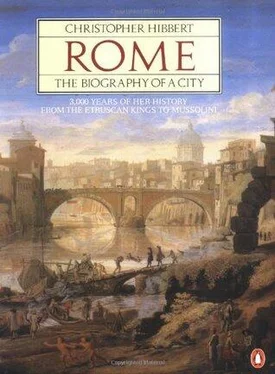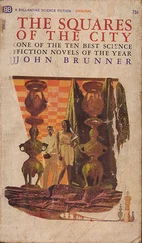Christopher Hibbert - Rome. The Biography of the City
Здесь есть возможность читать онлайн «Christopher Hibbert - Rome. The Biography of the City» весь текст электронной книги совершенно бесплатно (целиком полную версию без сокращений). В некоторых случаях можно слушать аудио, скачать через торрент в формате fb2 и присутствует краткое содержание. Жанр: Культурология, Искусство и Дизайн, на английском языке. Описание произведения, (предисловие) а так же отзывы посетителей доступны на портале библиотеки ЛибКат.
- Название:Rome. The Biography of the City
- Автор:
- Жанр:
- Год:неизвестен
- ISBN:нет данных
- Рейтинг книги:3 / 5. Голосов: 1
-
Избранное:Добавить в избранное
- Отзывы:
-
Ваша оценка:
- 60
- 1
- 2
- 3
- 4
- 5
Rome. The Biography of the City: краткое содержание, описание и аннотация
Предлагаем к чтению аннотацию, описание, краткое содержание или предисловие (зависит от того, что написал сам автор книги «Rome. The Biography of the City»). Если вы не нашли необходимую информацию о книге — напишите в комментариях, мы постараемся отыскать её.
Rome. The Biography of the City — читать онлайн бесплатно полную книгу (весь текст) целиком
Ниже представлен текст книги, разбитый по страницам. Система сохранения места последней прочитанной страницы, позволяет с удобством читать онлайн бесплатно книгу «Rome. The Biography of the City», без необходимости каждый раз заново искать на чём Вы остановились. Поставьте закладку, и сможете в любой момент перейти на страницу, на которой закончили чтение.
Интервал:
Закладка:
When the palace was finished Nero declared, ‘Good! Now at last I can begin to live like a human being!’ But, in fact, he had only a short time left to enjoy the fantastic setting he had created for himself. Hated by the people of Rome, he was also detested by the Senate whose independence was lost and whose members, in constant danger of being tried for treason, were denied high office by the Emperor's preference for Greeks and orientals. A group of Senators and others conspired to replace him. The plot was discovered, however; the conspirators were hunted down and executed; and Nero became more tyrannical and megalomaniacal than ever. Identifying himself with several gods, including Apollo, god of the sun and of the arts, he claimed to be above the natural laws that governed mortal man. When news of fresh revolts reached him, he merely laughed, ordered another banquet, and composed more songs, proclaiming that he had only to appear and to sing to bring the world to his feet.
Then one night in 68 the Emperor awoke from a troubled dream and found the palace strangely quiet. His guests had fled and even his guards had gone. He ran through the empty rooms and, returning to his bedroom, discovered that a golden box of poisons which he kept there had been removed. He shouted for the gladiator, Spiculus, who could, if the occasion demanded, kill him with a single, painless blow of his sword. But Spiculus had fled with the others. At length Nero came upon an attendant who offered him refuge in his house beyond the city walls.
He mounted a horse just as he was, ‘barefooted and with an old faded cloak thrown over the tunic,’ Suetonius recorded. ‘His head was covered with a handkerchief across his face… All of a sudden there was an earth tremor, and lightning flashed right in his face. Terrified, he heard soldiers in a nearby camp cursing him, and he heard a passer-by say, “These men must be after Nero.”’ His horse took fright and shied at the stench of a corpse which had been left on the road, and the jolt pulled the handkerchief from his head. A veteran of the Praetorian Guard, recognizing him, saluted out of habit.
Outside the house he waited while a tunnel was dug so that he could enter it unobserved. He scooped up some water from a pond, murmuring, ‘This is Nero's iced water now.’ He crawled on all fours through the tunnel into the nearest room where he lay down on a thin mattress covered by his old cloak. He was offered a piece of coarse brown bread but, although he was hungry, he refused to eat. Abandoning all hope, he ordered that a trench be dug just large enough to take his fat body, and that wood and water should be fetched so that the last rites could be properly observed. He burst into tears as the materials were gathered, crying out again and again, ‘What a great artist dies in me!’
A message was brought to the house: the Emperor had been declared a public enemy by the Senate and, as soon as he was discovered, was to be executed as criminals had been in the days of his ancestors. He asked what kind of death that was, and was told he would be stripped naked, tied to a stake and flogged to death. He picked up a dagger and tried its edge, but he lacked the courage to use it. Asking for someone to set him an example of suicide, he reproached himself for his lack of resolution. ‘It is a disgrace for me to go on living like this,’ he said in Greek. ‘It is unworthy of a man like Nero.’ But it was not until he heard the clatter of horses' hooves outside that he summoned the courage to strike the blow. Whispering a line from Homer in a trembling voice – ‘and in my ears there rings the beat of swift-footed horses’ – he seized the dagger and, with help, pushed it into his throat.
After the death of Nero, the last of the emperors from the family of Augustus, the Empire, which for all the many failings of the imperial court had been governed well in his reign, was torn by civil war. Emperor followed briefly upon emperor. First Galba, the rich governor of Nearer Spain, was hailed by his soldiers and marched on Rome, but he was soon murdered. Then Otho, his successor, was driven to commit suicide. And Vitellius, who followed Otho, was lynched in a Roman street. Quietly waiting his opportunity, however, was a 60-year-old man whom Nero, having once disgraced for falling asleep during one of the imperial song recitals, had appointed to crush a revolt in the province of Judaea. This was the wary, hard-working, autocratic yet amiable Vespasian, whose simple tastes befitted the son of an honest Sabine tax-collector. Proclaimed Emperor in Egypt, where he had served after leaving Judaea, Vespasian declined to leave for Rome until he had consulted the oracles. But these being favourable, he entered the city, and under his rule, which lasted for ten years from 69, Rome slowly recovered from the damage which the months of civil disturbances and the wild extravagance of Nero and Vitellius had inflicted upon it. His financial measures were unconventional but effective; his solid, approachable character, his unaffected love for the simple, country life to which he had grown accustomed as a child in a village in the Sabine hills, and his rugged, bluff good humour endeared him to the Roman citizens. Maintaining a regular daily routine, Vespasian rose early, received friends and deputations as he dressed, attended conscientiously to affairs of state, drove out for a ride in his carriage, went to bed with one of his mistresses, had a bath, then enjoyed an ample though never exotic dinner, often making a crude joke as he ate. His jokes were celebrated, and one in particular was cited as characteristic. It concerned a tax which he had levied on the ammoniac urine that the Roman fullers collected from the city's public urinals to use in the dyeing of cloth. Vespasian's son regarded this tax as unseemly and voiced his objections to his father. Vespasian held a coin under his son's nose, urging him to notice that gold had no smell.
With the money that he raised, Vespasian was able to restore the buildings which had been damaged or burned in the reigns of his predecessors and to construct so many new ones that he felt himself justified in inscribing on his coinage the legend, Roma Resurgens . Appearing on building-sites with a basket of masonry on his shoulder, he gave personal encouragement to the redevelopment of the Capitol and the Forum; he lavishly restored a sanctuary dedicated to Claudius; 32he erected in a new Forum 33the now vanished Temple of Peace to house treasures looted from Jerusalem; 34and he began, on the site of Nero's drained lake, that most famous of Rome's ancient monuments, the Colosseum.
THREE
BREAD AND CIRCUSES
‘Rome has been restored to herself,’ wrote the Spanish poet Martial when the ‘far-seen amphitheatre’ was nearing completion. ‘What was formerly a tyrant's delight is now the delight of the people.’ The tyrant's colossal column, the figure on the summit replaced by that of the sun-god, still stood nearby and it was possibly this, rather than the vast size of the Colosseum itself, that gave the amphitheatre its name. The measurements were daunting. Its oval ground area, 617 feet long by 513 feet wide, enclosed an arena 282 feet by 177 feet. The surrounding walls rose in four storeys to a height of 187 feet. The top floor, an enclosed, colonnaded gallery, was reserved for women and the poor, who sat on wooden seats; the floor immediately below this, also enclosed, was reserved for slaves and foreigners; beneath this were tiers of exposed marble seats, the higher for the middle class, the lower for more distinguished citizens. Just above the level of the ringside were the boxes of the Senators, magistrates, priests, Vestal Virgins and members of the Emperor's family. High overhead on the roof of the topmost gallery, were sailors expert in the handling of canvas whose duty it was to pull across a coloured awning to protect the spectators from rain or the heat of the sun.
Читать дальшеИнтервал:
Закладка:
Похожие книги на «Rome. The Biography of the City»
Представляем Вашему вниманию похожие книги на «Rome. The Biography of the City» списком для выбора. Мы отобрали схожую по названию и смыслу литературу в надежде предоставить читателям больше вариантов отыскать новые, интересные, ещё непрочитанные произведения.
Обсуждение, отзывы о книге «Rome. The Biography of the City» и просто собственные мнения читателей. Оставьте ваши комментарии, напишите, что Вы думаете о произведении, его смысле или главных героях. Укажите что конкретно понравилось, а что нет, и почему Вы так считаете.












